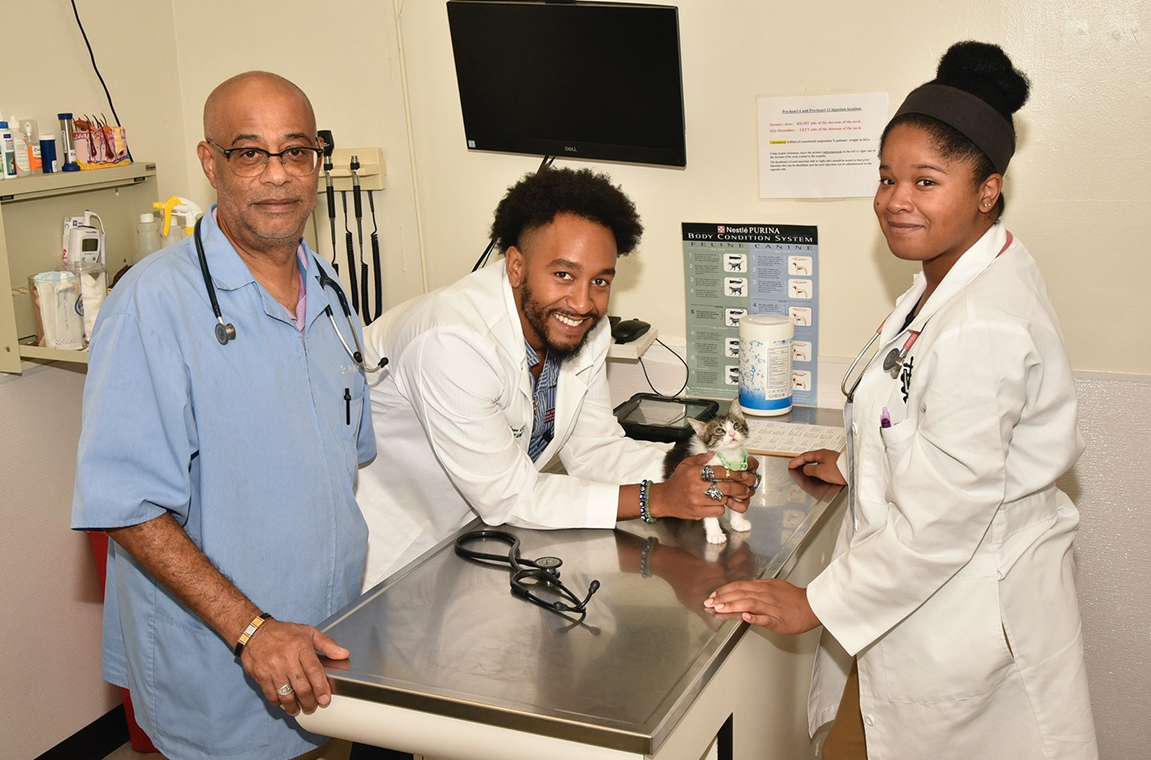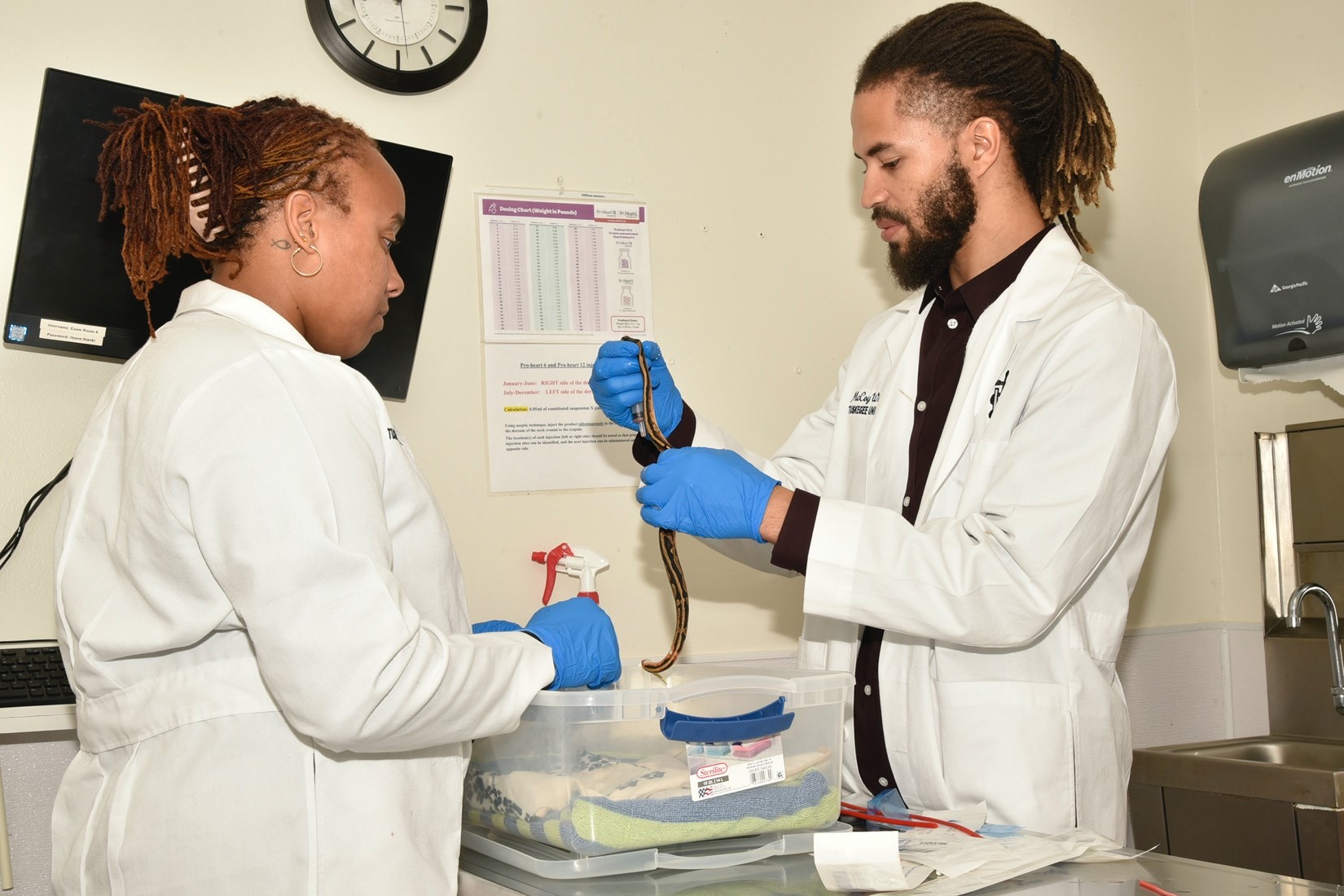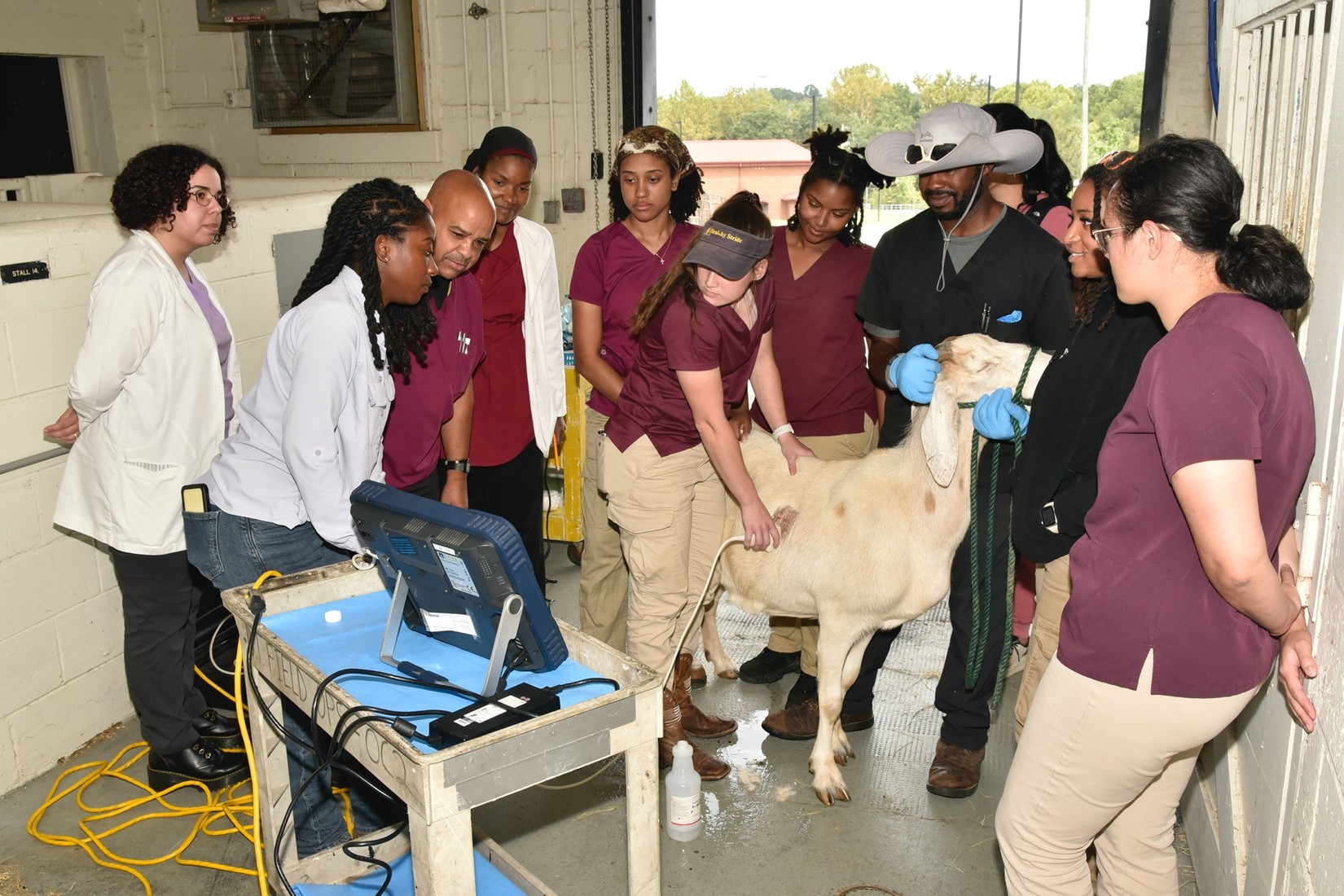Contact: Crystal Drake, Office of Communications, Public Relations and Marketing
and Anissa Riley, College of Veterinary Medicine

Even as the veterinary teaching hospital prepares for expansion, the clinicians, veterinary technicians and veterinary assistants are ready to serve more patients –from small and large animals to exotics.
“We have a talented and dedicated veterinary medicine team ready to see more patients on a weekly basis,” said Dr. Ebony Gilbreath, interim dean of the Tuskegee University College of Veterinary Medicine (TUCVM). “Our veterinary staff invites more pet and animal owners across the region to utilize our services – we’re excited about things to come as we continue to provide compassionate, world-class care.”
The Tuskegee University Veterinary Teaching Hospital has 16 veterinarians and 16 veterinary technicians and assistants on staff to deliver a wide variety of care for a variety of family pets, including exotic animals, horses and farm animals.
“Our veterinary teaching hospital continues to solve for the urgent needs across the country for more veterinarians, particularly in our rural communities, as that number continues to fall short,” said Dr. Mark A. Brown, president and CEO of Tuskegee University. “The future of agriculture depends on access to veterinary care, and we are focused on remaining a vital part of the solution. The more animals we care for at our teaching hospital, the more advanced our students become in both general and specialist-level medicine.”

The teaching hospital, located on the Tuskegee University campus at 1607 Hospital Road. It is open Monday, Tuesday, Thursday and Friday from 8:00 a.m. to 4:30 p.m., on Wednesday from 8:00 a.m. to 7:00 p.m. and on Saturday from 8:00 a.m. to noon. The teaching hospital is open on Sunday for emergency services only.
“We manage a full spectrum of routine preventive care, specialty examinations as well as in-house consultation with other referral services, house calls, and emergency and critical care,” said Dr. Gilbreath. “We also offer the convenience of farm calls.”
Last month, the Tuskegee University College of Veterinary Medicine (TUCVM) turned the soil on what will be the new 57,000-square-foot small animal teaching hospital, continuing the university’s 80-year legacy as a leader in training veterinarians in the United States.
The groundbreaking was phase one of a project that includes the teaching hospital and a preclinical instruction building. The project will consolidate critical support services under one roof, increasing efficiency and faster turn-around times for students and the small animals they treat. A modernized reception and waiting area will ease access for the Macon County community and surrounding area, which has for decades relied on Tuskegee University for animal care.

Founded in 1945, TUCVM has trained over 70 percent of African American veterinarians in the United States and currently boasts the most diverse student body among all U.S. colleges of veterinary medicine.
The new facilities are expected to be completed by the fall of 2027.
In addition to our doctors, TUCVM has a dedicated team of technicians and staff. Last week, TUCVM honored the contributions of veterinary technicians and assistants during National Veterinary Technician Week. Tuskegee’s vet techs and support staff provide compassion, skill and commitment to patients daily and play a vital role in the efficient operation of the teaching hospital.
“Their hard work and commitment to support our clinical faculty, interns, students and the entire Tuskegee University Veterinary Teaching Hospital team is essential to our success. We simply couldn’t function without them and are deeply grateful for all they do for the college and the animals we care for,” Dr. Gilbreath said.
If you have an animal in need of care, please make an appointment by calling 334-727-8436 or email
tucvmvetcare@tuskegee.edu.
© 2025 Tuskegee University


 Even as the veterinary teaching hospital prepares for expansion, the clinicians, veterinary technicians and veterinary assistants are ready to serve more patients –from small and large animals to exotics.
Even as the veterinary teaching hospital prepares for expansion, the clinicians, veterinary technicians and veterinary assistants are ready to serve more patients –from small and large animals to exotics. The teaching hospital, located on the Tuskegee University campus at 1607 Hospital Road. It is open Monday, Tuesday, Thursday and Friday from 8:00 a.m. to 4:30 p.m., on Wednesday from 8:00 a.m. to 7:00 p.m. and on Saturday from 8:00 a.m. to noon. The teaching hospital is open on Sunday for emergency services only.
The teaching hospital, located on the Tuskegee University campus at 1607 Hospital Road. It is open Monday, Tuesday, Thursday and Friday from 8:00 a.m. to 4:30 p.m., on Wednesday from 8:00 a.m. to 7:00 p.m. and on Saturday from 8:00 a.m. to noon. The teaching hospital is open on Sunday for emergency services only.  Founded in 1945, TUCVM has trained over 70 percent of African American veterinarians in the United States and currently boasts the most diverse student body among all U.S. colleges of veterinary medicine.
Founded in 1945, TUCVM has trained over 70 percent of African American veterinarians in the United States and currently boasts the most diverse student body among all U.S. colleges of veterinary medicine.